We often ignore the driveway when considering our house’s curb appeal. Different types of driveway paving ideas will complement the house’s exterior. One has to keep in mind the factors while choosing the type of driveway. Furthermore, every kind of driveway has advantages and disadvantages thus conditions govern the type of driveway that will be used.
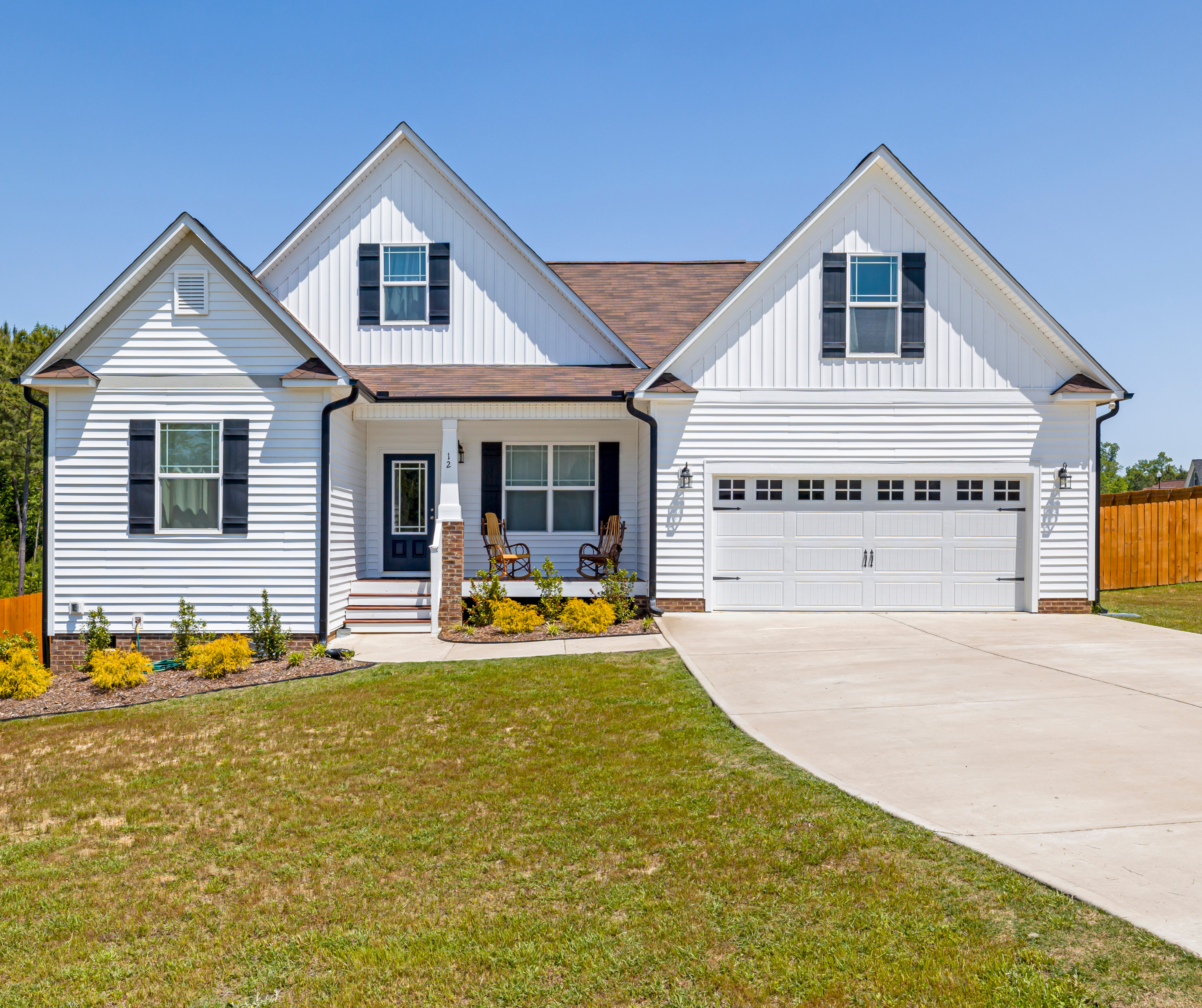
Table of Contents
Factors to Consider While Choosing Different Types of Driveway Paving
There are different factors to be considered when choosing the type of driveway paving. The chief among them are discussed below;
1. Durability of the Material
You want a material that can withstand the weight of vehicles and foot traffic without cracking or breaking. Furthermore, some of the most durable materials include concrete, asphalt, and interlocking pavers.
2. Maintenance Requirements
Some materials require regular sealing or coating to protect them from the elements, while others are virtually maintenance-free. Hence, the material should be the one which requires less maintenance.
3. Aesthetics
Firstly, if you want a cohesive look, you’ll want to choose a material that complements your home’s architectural style and colour scheme. Thus, attractive material should be used.
4. Cost
The cost of materials and installation can vary widely depending on the type of material you choose, the size of your driveway, and the complexity of the installation.
5. Climate
If you live in an area with extreme temperature fluctuations, you’ll want to choose a material that can withstand freezing and thawing without cracking or breaking.
6. Environmental Impact
If you’re concerned about the environmental impact of your driveway, you’ll want to choose a material that’s eco-friendly. Furthermore, as climate change is a severe issue nowadays, one must choose environment-friendly materials.
7. Drainage
Proper drainage is essential for maintaining the integrity of your driveway. If water is allowed to pool on your driveway, it can seep into the pavement and cause damage over time.
Types of Driveway Paving
There are different types of driveway paving with diverse advantages and disadvantages. Furthermore, each type of driveway paving has its own cost depending upon the conditions. Some of the most important types of driveway paving are discussed below;
1. Asphalt Driveway Paving
Asphalt driveway paving is the process of laying a mixture of sand, gravel, and asphalt cement on a prepared base. In addition, the asphalt cement acts as a binding agent, holding the mixture together and providing a smooth, durable surface for vehicles to drive on.
Cost
On average, the cost of asphalt driveway paving ranges from $3 to $5 per square foot depending upon the complexity, labour work needed, etc.
Different Types of Asphalt Paving
Hot Mix Asphalt (HMA), Warm Mix Asphalt (WMA), Porous Asphalt, Perpetual Pavement, Stone Matrix Asphalt (SMA), and Open-Graded Friction Course (OGFC).
Advantages of Asphalt Driveway Paving
- Asphalt is a durable material that can withstand heavy traffic and extreme weather conditions
- Asphalt driveway paving is one of the most affordable options available.
- This driveway paving is a quick and easy process
- It can be customized to match any aesthetic preference by using different colours and textures.
Disadvantages of Asphalt Driveway Paving
- Asphalt driveways require regular maintenance, including seal coating, crack filling, and periodic resurfacing to extend their lifespan.
- It is durable, extreme weather conditions, such as heavy rainfall, snow, and hail, can damage the surface.
- Asphalt is not an eco-friendly material and can release harmful chemicals during the manufacturing process.
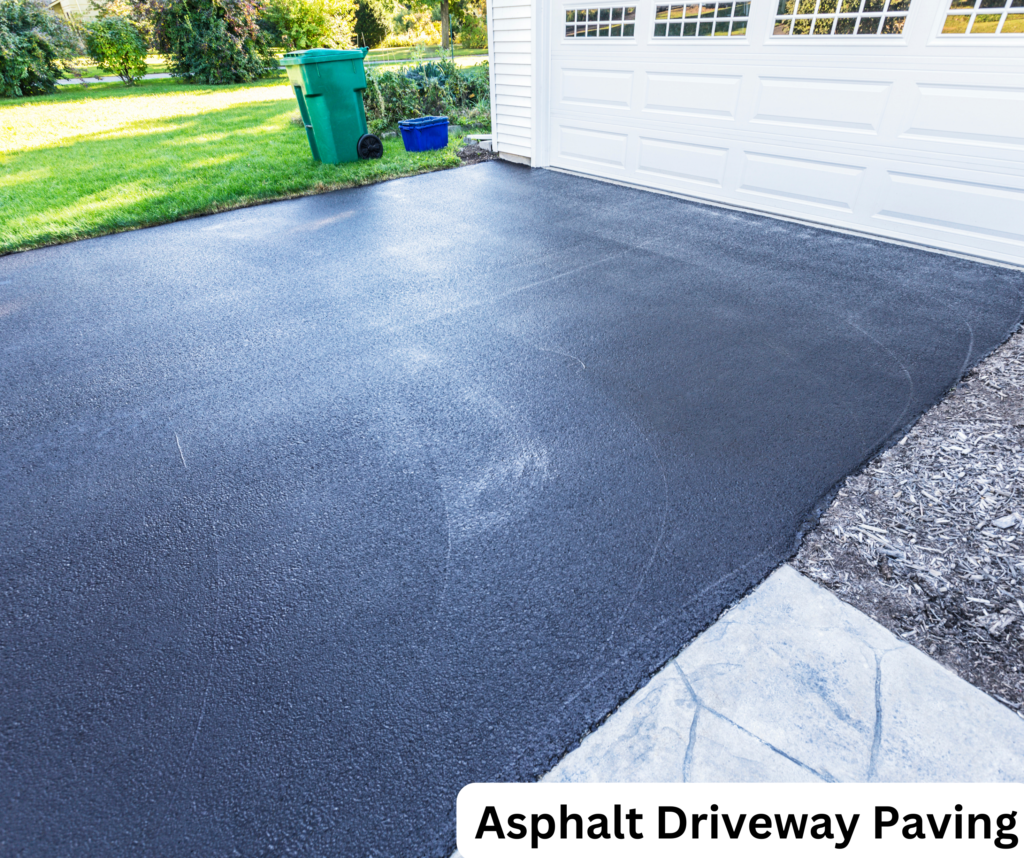
2. Concrete Driveway Paving
Concrete driveway paving involves laying a mixture of cement, sand, water, and gravel on a prepared base. Then the mixture is poured onto the prepared surface and left to cure and harden into a solid surface that can withstand heavy traffic.
Cost
On average, the cost of concrete driveway paving ranges from $5 to $10 per square foot depending upon the complexity, labour work needed, etc.
Different Types of Concrete Paving
Plain Concrete, Stamped Concrete, Exposed Aggregate Concrete, Colored Concrete, Stained Concrete and Polished Concrete.
Advantages of Concrete Driveway Paving
- Concrete is one of the most durable materials available for driveway paving.
- It can be customized with various colours, textures, and patterns to match your aesthetic preference.
- Concrete driveways are low maintenance and only require occasional cleaning and sealing.
- Concrete is an eco-friendly material, as it is made from natural materials and can be recycled.
Disadvantages of Concrete Driveway Paving
- Concrete driveways are prone to cracking due to temperature changes, heavy traffic, and settlement.
- It is susceptible to staining from oil spills, tire marks, and other contaminants.
- Concrete can be slippery, especially when wet, which can pose a safety hazard.
- It is generally more expensive than other driveway paving materials such as asphalt.
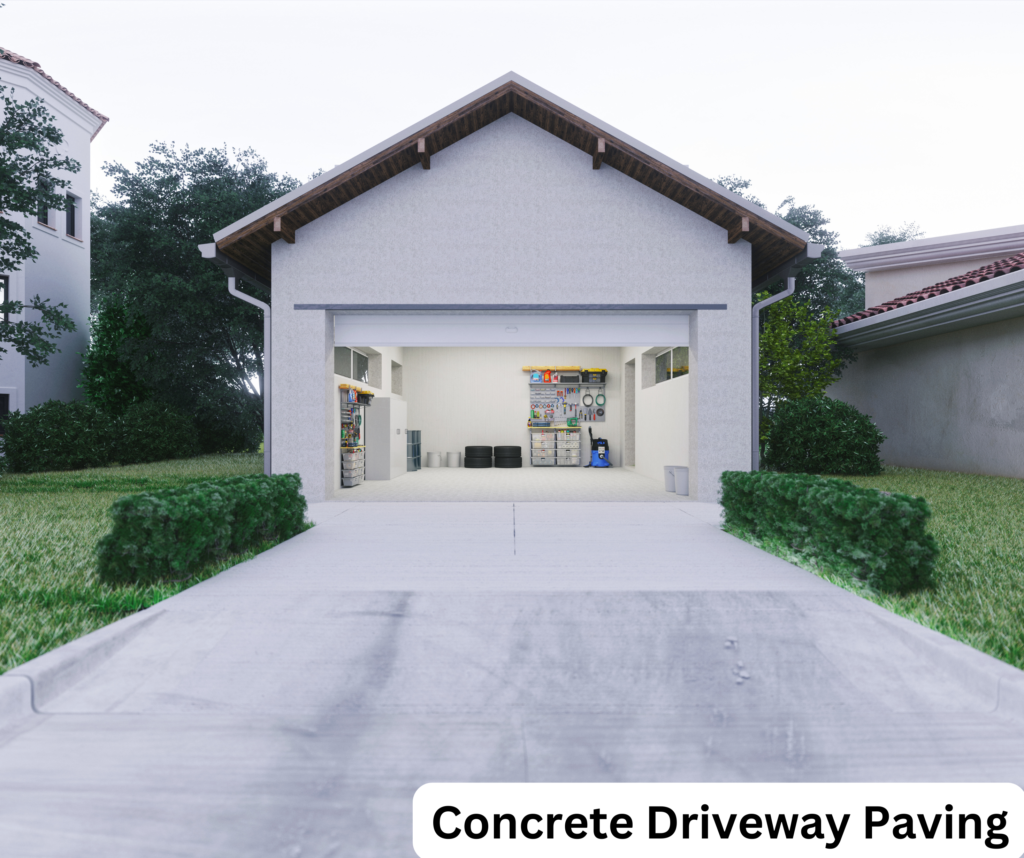
3. Gravel Driveway Paving
A gravel driveway is a driveway made of small, loose stones or pebbles that are laid on top of a solid base, such as crushed stone or gravel. Furthermore, gravel driveways are commonly used in rural areas and can be a cost-effective alternative to more expensive materials.
Cost
On average, the cost of gravel driveway paving ranges from $1 to $3 per square foot depending upon the complexity, labour work needed, etc.
Different Types of Gravel Paving
Crushed Stone, Pea Gravel, Crushed Granite, River Rock, and Limestone.
Advantages of Gravel Driveway Paving
- One of the most cost-effective options for driveway paving.
- Require little maintenance and only require occasional grading and filling of potholes.
- It can be customized with different colours and textures to match your aesthetic preferences.
- Gravel driveways have good drainage properties.
Disadvantages of Gravel Driveway Paving
- It can generate dust and scatter gravel, which can be a nuisance and a hazard to pedestrians.
- It requires regular maintenance.
- Gravel driveways can be slippery and provide limited traction, especially in wet or icy conditions.
- They are not suitable for heavy traffic.
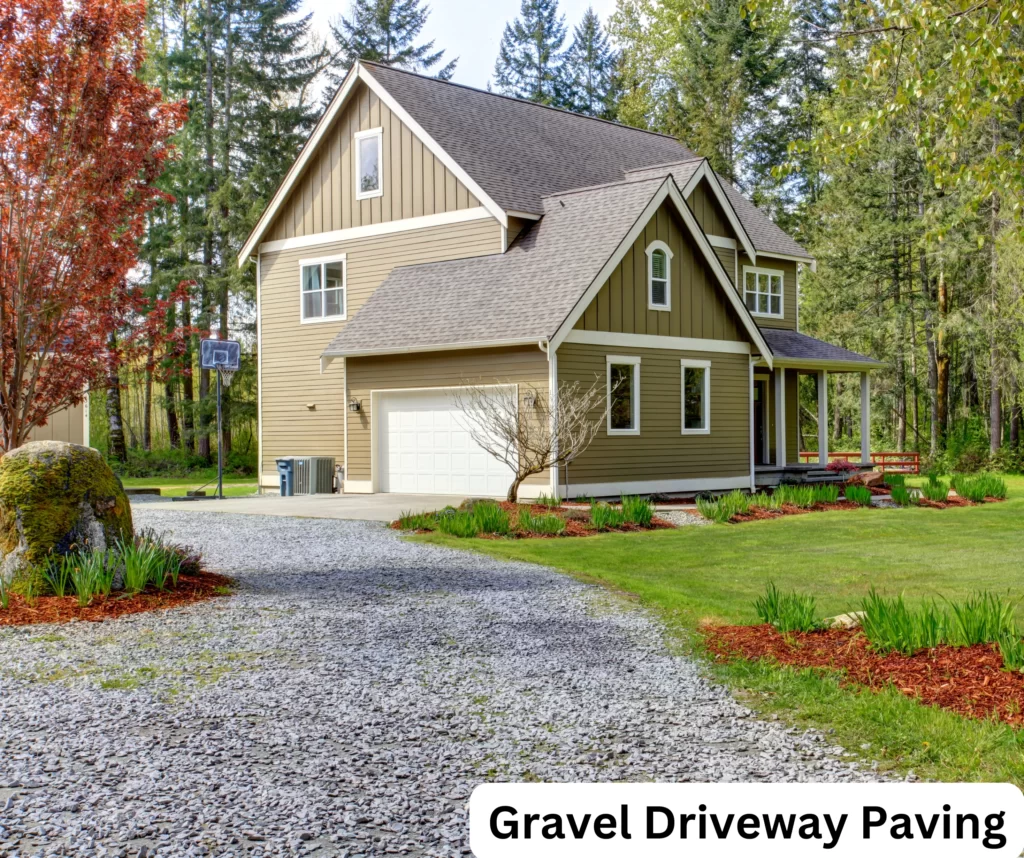
4. Brick Driveway Paving
A brick driveway is a driveway made of interlocking bricks that are laid on top of a solid base, such as sand or concrete. Furthermore, they are a popular choice for their durability, aesthetic appeal, and low maintenance requirements.
Cost
On average, the cost of brick driveway paving ranges from $10 to $30 per square foot depending upon the complexity, labour work needed, etc.
Different Types of Brick Paving
Standard Brick Pavers, Cobblestone Pavers, Permeable Pavers, Interlocking Pavers, Tumbled Pavers and Basketweave Pavers.
Advantages of Brick Driveway Paving
- Brick driveways are known for their durability and can last for decades.
- They have a classic and timeless look that can add curb appeal to your home.
- They require little maintenance.
- Offer a variety of design options, including different colours, patterns, and textures.
Disadvantages of Brick Driveway Paving
- They are more expensive than other driveway paving options.
- They can be slippery when wet or icy, which can be a safety hazard.
- Weeds can grow between bricks.
- They are not suitable for heavy loads.
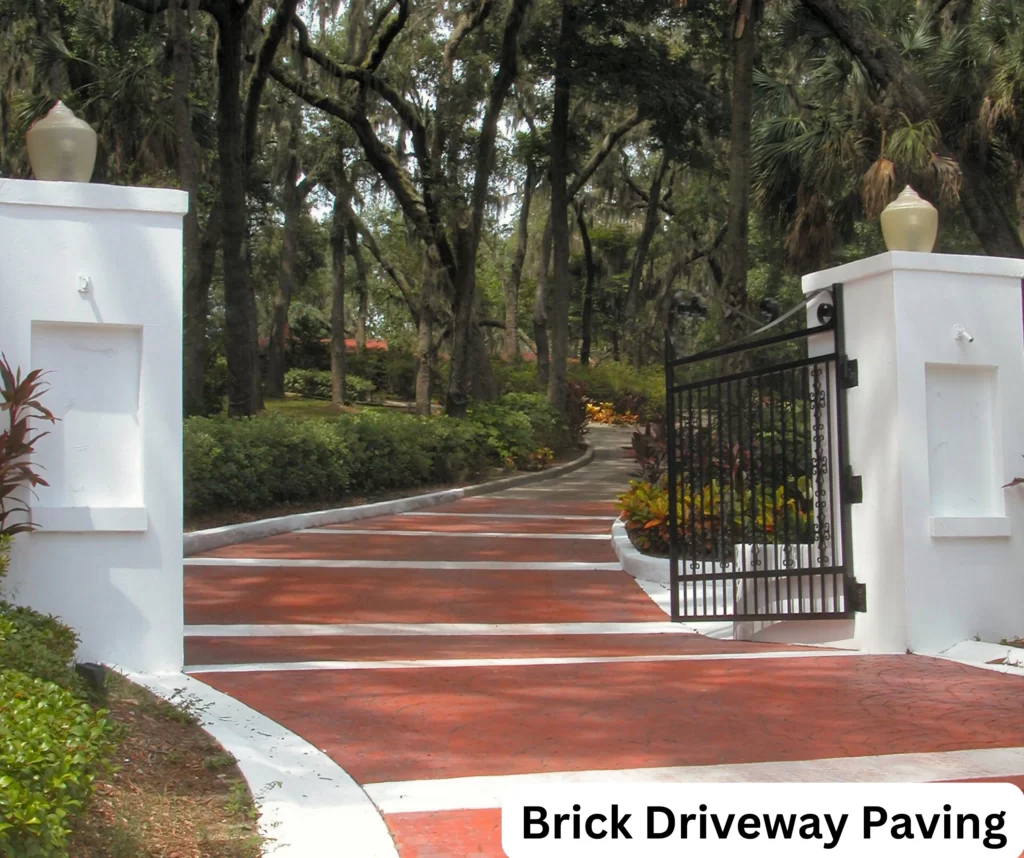
5. Cobblestone Driveway Paving
Cobblestone driveway paving involves using naturally rounded stones that are typically made of granite, basalt, or other types of rock. These stones are laid in a specific pattern on top of a solid base, such as sand or concrete. Furthermore, Cobblestone driveways have been used for centuries and are known for their durability, aesthetic appeal, and unique texture.
Cost
On average, the cost of cobblestone driveway paving ranges from $25 to $40 per square foot depending upon the complexity, labour work needed, etc.
Different Types of Cobblestone Paving
Granite cobblestones, Basalt cobblestones, Sandstone cobblestones, Limestone cobblestones, Porphyry cobblestones.
Advantages of Cobblestone Driveway Paving
- Cobblestone driveways are known for their durability and can last for decades.
- They have a unique and rustic look.
- Cobblestone driveways require little maintenance.
- They offer good traction.
Disadvantages of Cobblestone Driveway Paving
- Cobblestone driveways are more expensive than other driveway paving options.
- They can have an uneven surface.
- Weeds can grow between the stones.
- Cobblestone driveways are not suitable for heavy loads.
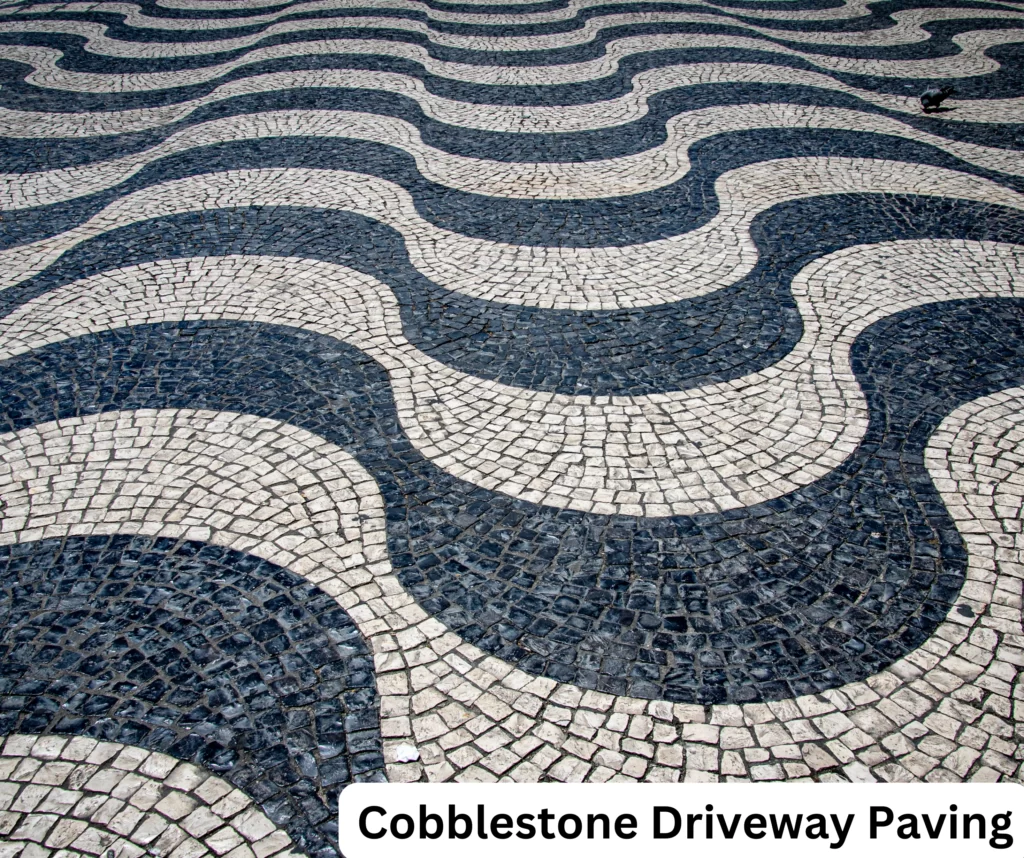
6. Pavers Driveway Paving
Pavers driveway paving involves using interlocking concrete, brick, or stone units to create a solid and durable surface for your driveway. Furthermore, the pavers come in a wide range of colours, shapes, and patterns, allowing homeowners to create a unique and personalized look for their driveway.
Cost
On average, the cost of pavers driveway paving ranges from $10 to $30 per square foot depending upon the complexity, labour work needed, etc.
Different Types of Cobblestone Paving
Concrete Pavers, Clay Pavers, Natural Stone Pavers, Permeable Pavers, Brick Pavers, and Rubber Pavers.
Advantages of Pavers Driveway Paving
- Pavers driveway paving is durable and can withstand heavy traffic.
- They come in a variety of colours, shapes, and patterns.
- They require little maintenance.
- Pavers can be easily replaced without affecting the rest of the driveway.
Disadvantages of Pavers Driveway Paving
- Pavers driveway paving may have an uneven surface.
- Weeds can grow between the pavers.
- They may be susceptible to staining.
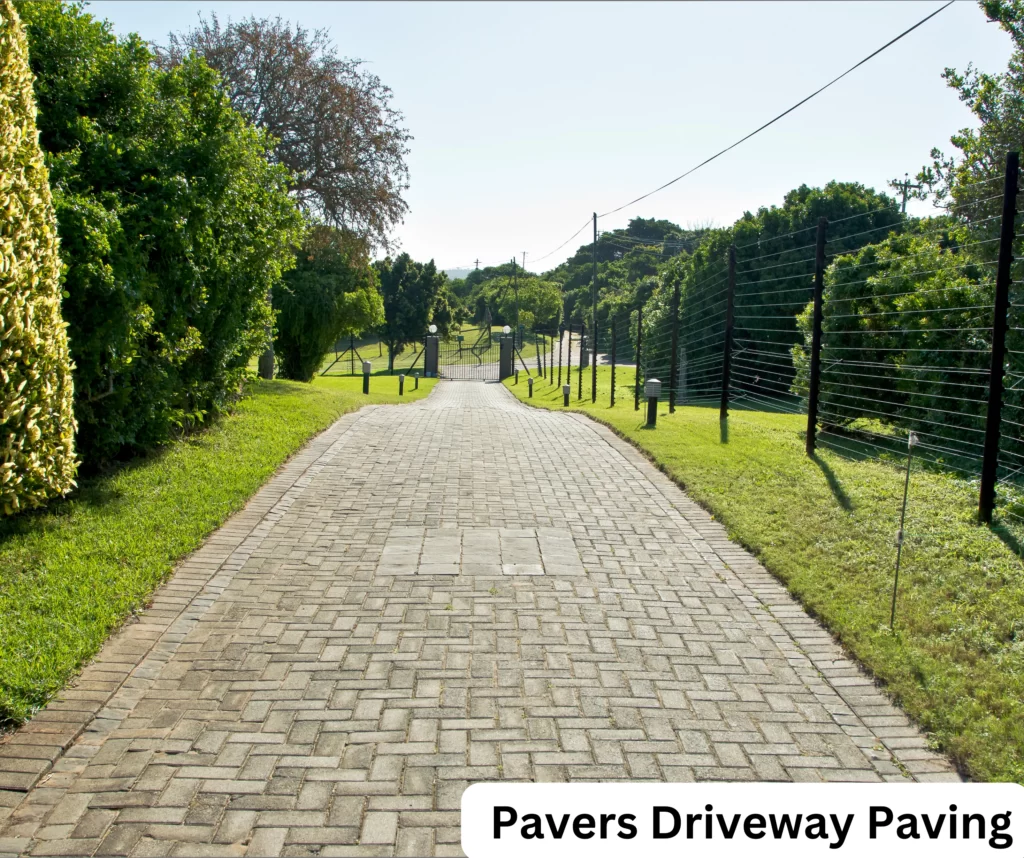
7. Tar and Chip Driveway Paving
Tar and chip driveway paving involves the application of a mixture of hot liquid asphalt and stone chips to the surface of a driveway. Thus, the process involves laying down a layer of hot liquid asphalt, followed by a layer of stone chips. Thus, the process is repeated until the desired thickness is achieved.
Cost
On average, the cost of tar and chip driveway paving ranges from $3 to $5 per square foot depending upon the complexity, labour work needed, etc.
Different Types of Tar and Chip Paving
Standard Tar and Chip, Polymer-Modified Tar and Chip, Tar and Chip with Fiberglass, Single-Coat Tar and Chip, and Double-Coat Tar and Chip.
Advantages of Tar and Chip Driveway Paving
- Tar and chip driveway paving is cost-effective.
- It requires minimal maintenance.
- The rough surface of tar and chip driveway paving provides excellent traction.
- It comes in a variety of colours and textures.
Disadvantages of Tar and Chip Driveway Paving
- The rough surface of tar and chip driveway paving may not be suitable for those with mobility issues.
- It has a shorter lifespan than traditional asphalt or concrete paving.
- Tar and chip driveway paving may not be suitable for areas with heavy traffic.
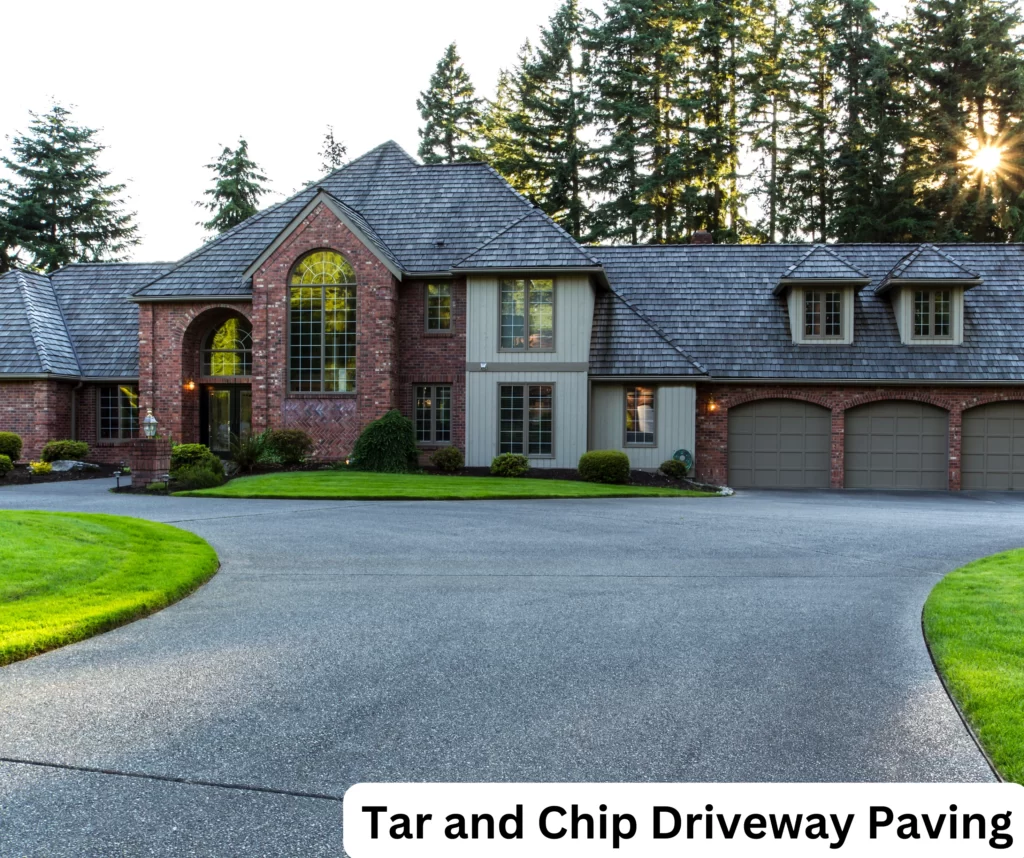
8. Interlocking Driveway Paving
Interlocking driveway paving involves the use of interlocking pavers made from concrete, stone, or other materials to create a durable and visually appealing surface for driveways. Thus, the pavers are designed to interlock with each other, creating a stable and long-lasting surface for vehicles to drive on.
Cost
On average, the cost of interlocking driveway paving ranges from $10 to $30 per square foot depending upon the complexity, labour work needed, etc.
Different Types of Interlocking Paving
Concrete pavers, Brick pavers, Cobblestone pavers, Permeable pavers, and Rubber pavers.
Advantages of Interlocking Driveway Paving
- Interlocking driveway paving is highly durable.
- They come in a wide variety of colours, shapes, and textures.
- They require minimal maintenance.
- It can be easily replaced without having to replace the entire driveway.
Disadvantages of Interlocking Driveway Paving
- Interlocking driveway paving is a more expensive option.
- Weeds can sometimes grow between the pavers.
- Interlocking driveway pavers can be slippery when wet.
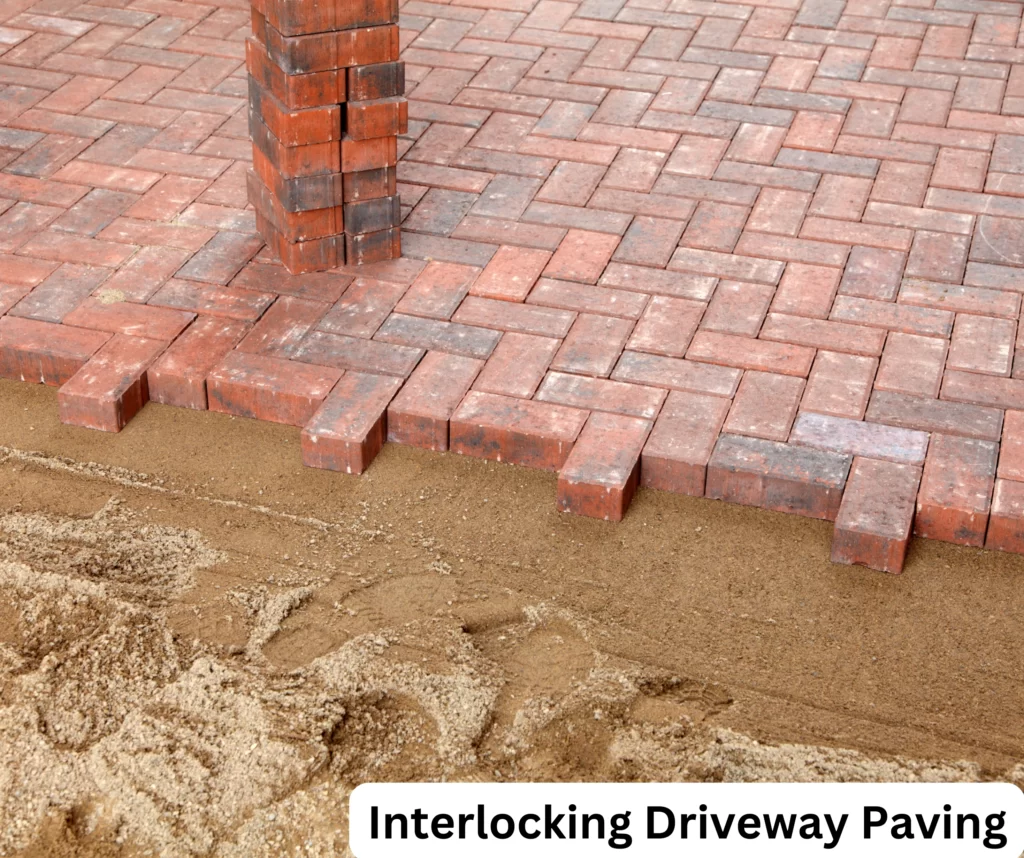
9. Stamped Concrete Driveway Paving
Stamped concrete driveway paving involves the use of concrete that is stamped with a pattern or texture to resemble natural stone, brick, or other materials. Furthermore, the concrete is poured and then stamped with a pattern or texture using special tools and moulds, creating a unique and visually appealing surface for driveways.
Cost
On average, the cost of stamped concrete driveway paving ranges from $10 to $20 per square foot depending upon the complexity, labour work needed, etc.
Different Types of Stamped Concrete Paving
Ashlar slate, Cobblestone, Herringbone, Wood plank and Random stone.
Advantages of Stamped Concrete Driveway Paving
- Stamped concrete driveway paving can be customized to resemble a wide variety of materials.
- It is highly durable.
- It requires minimal maintenance.
Disadvantages of Stamped Concrete Driveway Paving
- Stamped concrete driveway paving can crack over time due to natural wear and tear or shifting soil.
- It can be slippery when wet.
- The colour of the stamped concrete can fade due to exposure to sunlight and weather conditions.
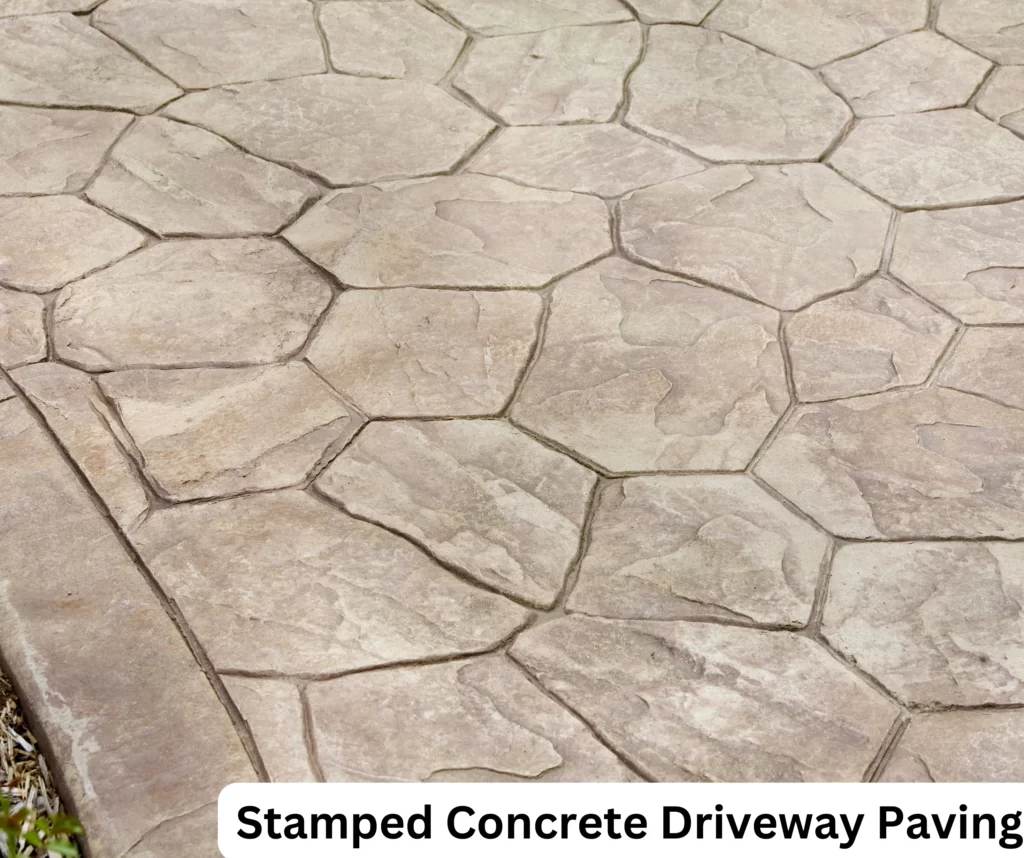
10. Grascrete Driveway Paving
Grasscrete driveway paving is a type of permeable paving that is designed to allow grass or vegetation to grow within its surface. Furthermore, the system consists of concrete blocks or cells with open areas that allow grass to grow through. The result is a driveway that is covered in grass, making it a unique and visually appealing option for homeowners.
Cost
On average, the cost of grascrete driveway paving ranges from $8 to $12 per square foot depending upon the complexity, labour work needed, etc.
Different Types of Grascrete Paving
Traditional Grascrete Driveway Paving, Grascrete with Pavers, Grascrete with Stamped Concrete and Grascrete with Colored Concrete.
Advantages of Grascrete Driveway Paving
- Grasscrete driveway paving is a sustainable and eco-friendly option.
- It adds a unique and visually appealing element to any property.
- Grasscrete driveway paving requires minimal maintenance.
Disadvantages of Grascrete Driveway Paving
- Grasscrete driveway paving has a limited weight capacity.
- It can be prone to weed growth, which can be unsightly and difficult to remove.
- Grasscrete driveway paving can be slippery when wet
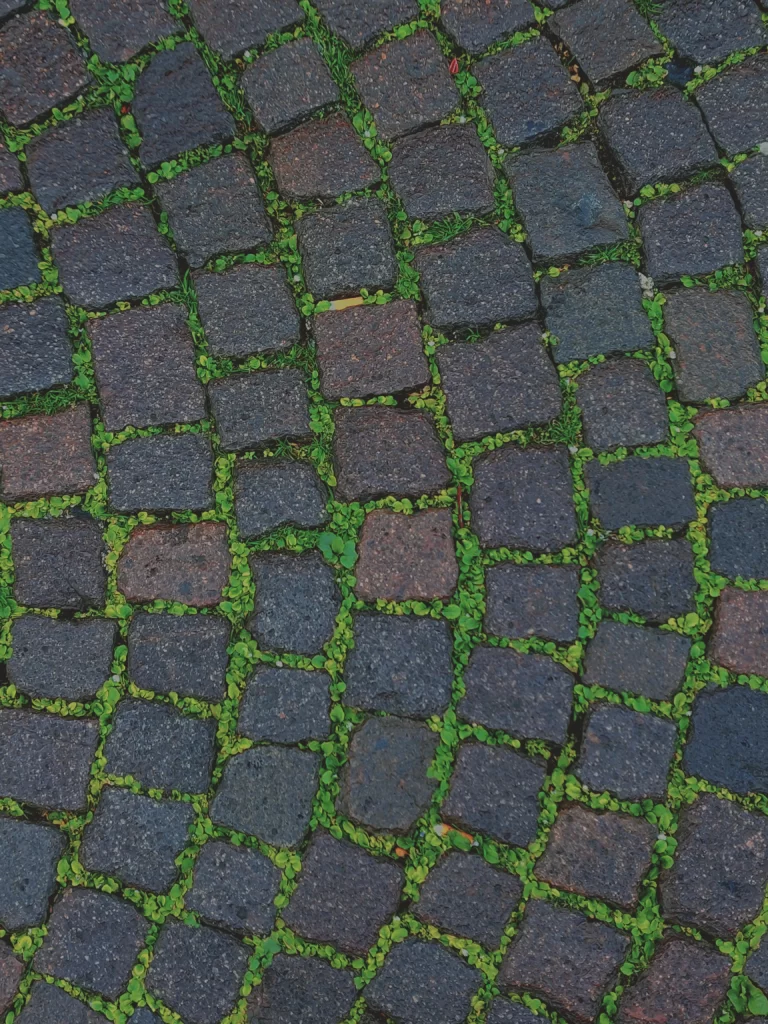
Conclusion
In a nutshell, driveway paving improves the curb appeal of a house. There are numerous types of driveway paving, many are discussed above. Different types of driveway paving ideas have their own advantages and disadvantages. Furthermore, the cost of each idea depends upon multiple factors. When considering the type of paving a person should keep in mind all the factors mentioned above.

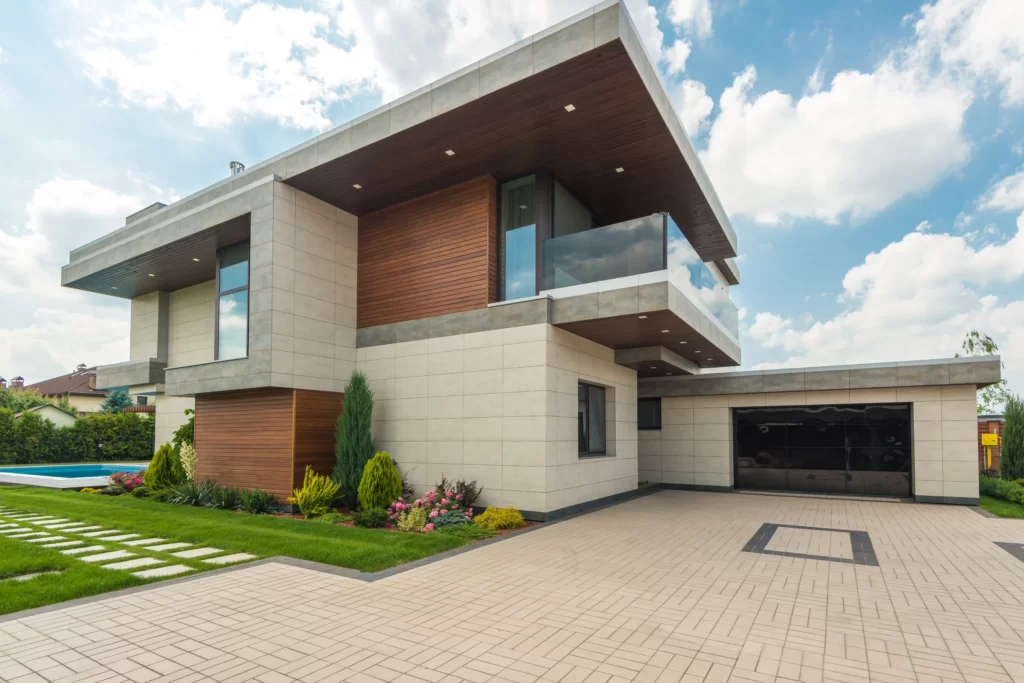
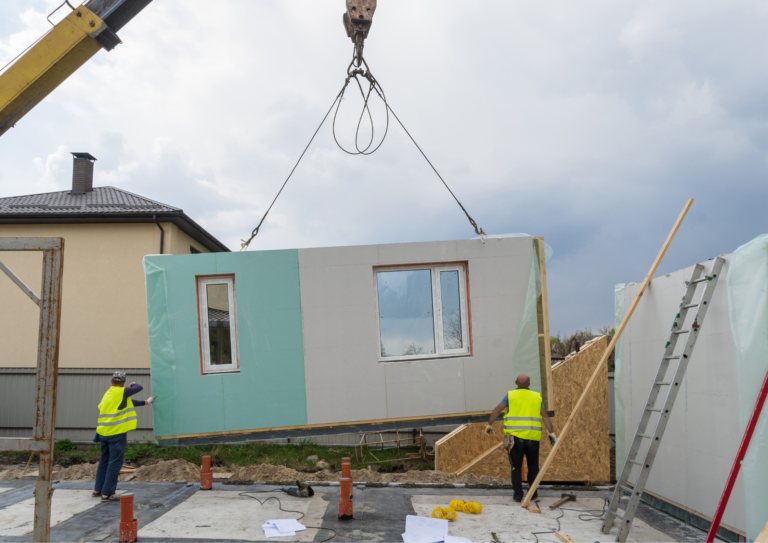
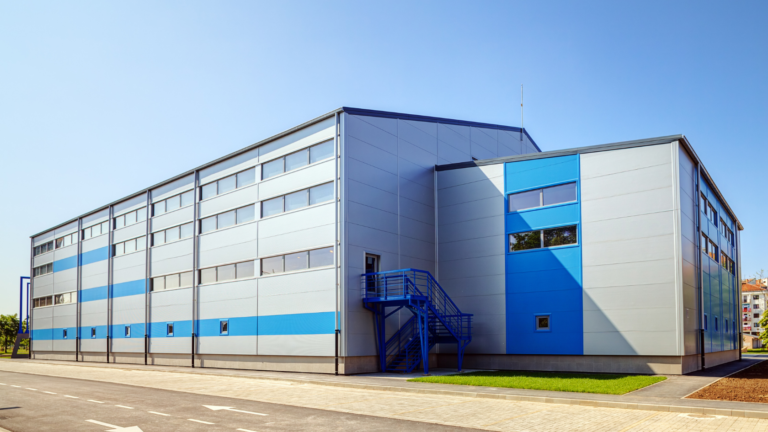
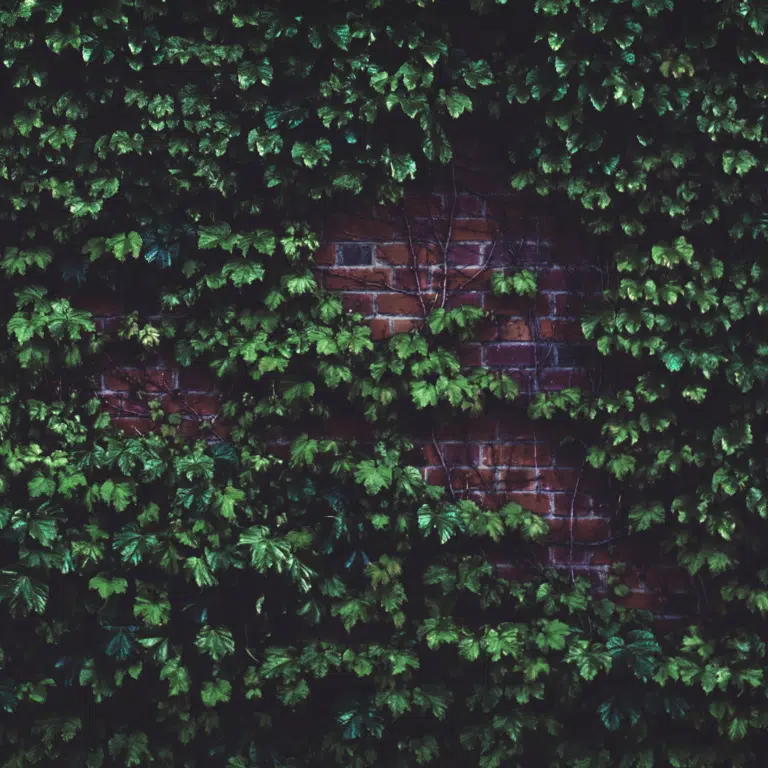

3 comments
How to Lay a Stepping Stone Path on Grass
[…] For inspiration on other types of paving, you can explore different options such as asphalt, concrete, cobblestone, or interlocking pavers. These materials can be used to create stunning driveways that complement your stepping-stone path. Learn more about various driveway paving options in our article “10 Different Types of Driveway Paving in the World.” […]
Matt S
What a comprehensive rundown of driveway paving options! I appreciate how you’ve highlighted the importance of considering factors like climate and environmental impact. One additional tip I’ve found useful is to think about lighting – incorporating well-placed lights along the driveway not only enhances safety but also adds a touch of elegance. Have you experimented with creative lighting solutions for your driveways? Thanks, Matt
Mr. Khan
Thank you so much Matt!